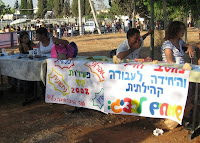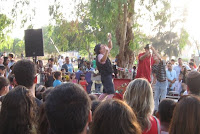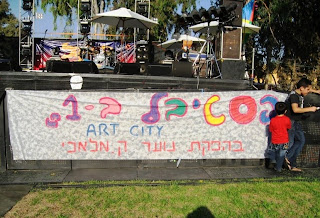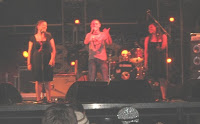The festival was founded in 2001 by a group of young community activists in the Jerusalem music scene. Shanan Street, lead vocalist of hip hop group Hadag Nahash, says he's pleased the festival has become a tradition. "I am very proud and excited that the festival has reached the age of five," he says.
 Wife of Hadag Nachash leader, together with Itai Z., the regional JAFI coordinator
Wife of Hadag Nachash leader, together with Itai Z., the regional JAFI coordinator Festival Coordinator (from the national non-profit)
Festival Coordinator (from the national non-profit)To provide what it does at such a price, Festival B'Shekel is registered as a non-profit organization. In addition to private donations, its funding comes from various sources, including the Jerusalem Foundation, Pratt Foundation Israel, the Israeli Lottery Council for the Arts, businesses including SanDisk, Omanut Laam, author David Grossman and musician Kobi Oz.
An event organizer heard one local Ethiopian-Israeli girl excited on entrace saying, "I have 11 shekels to spend here today." Usually 11 shekels does not go far, but it got her and a sister, brother or friend into the event and several fruit bars. At the Festival held the day before in the North of Israel, a coordinator was told by a mother of seven that if the event were more than a shekel, she could not afford to come.Festival B'Shekel's mission goes beyond providing a major, high-quality production for such a minuscule fee. Besides bringing music and culture to places and people that might not otherwise have access to such events, the festival hopes to encourage social and cultural growth across all of Israeli society. To help bring this about, activists head into communities on the periphery months prior to the festival to work with local youth, offering workshops on the array of skills necessary to produce such a huge event.
As in previous years, Festival B'Shekel took place this year in towns on the "periphery" rather than the Tel Aviv and Jerusalem venues where most similar events happen. This year Kiryat Malachi was one of the two towns where it was held. One main reason that the Festival non-profit chose to come to Kiryat Malachi last fall was because of a generous donation by the TIPS Partnership of Partnership 2000 of the Jewish Agency. When the joint American-Israeli steering committee of TIPS decided to focus its core funding on youth and young adults, it turned to the youth in Kiryat Malachi to see what they felt was most needed. There are a lot of talented youth in the arts, especially in dance, singing and bands, and theater. The youth asked for funds to put all of the arts programs for teens under one main program and for funds to help them become more professional.
Art City was organized in Kiryat Malachi as of July 1, 2007, as an umbrella organization to tie together teens in the arts in town, to develop a coordinated and professional group. In its first year it was wildly successful. The $60,000 donation from TIPS helped to bring in professionals to help teach teens to direct and coordinate the music, dance, and theater programs in town. Festival B'shekel also brought in professionals to help in this area with the intent that after this year, the expertise of these people would help Kiryat Malachi youth to continue to develop the arts. Dvora Attal was the city staff member who worked with the TIPS and Festival coordinators.
 Dvora and Guy
Dvora and GuyThe youth in Kiryat Malachi are extremely talented. They have just needed the tools to help them succeed, according to Guy and the festival directors.
Members of the TIPS steering committee attended an Art City show on January 31, 2008, and were very impressed by the quality of the acting, singing, and dancing.


We were told that another performance in May was a bit hit in town. An all youth steering committee worked with the town arts director and the Festival to plan the event. Before this year, the 30 members of the steering committee representing music, dance, theater, and stage design had never really gotten to know each other and each other's crafts. One main goal of the Art City project was to bring them together, to get to know each other and each other's talents, something that had not been done before. Guy, the city music coordinator, was also very much involved. Many others were involved including the town youth director and the assistant, Hila.
 Park site before the event.
Park site before the event.The day before the event, teens were busy making Festival signs. That evening, the city brought in Kobi Peretz for a concert in the part at 7:30. Over 2000 were in attendance. Unfortunately we were visiting a friend an watching the sunset at Ashkelon Beach and did not attend. Peretz is a Mizrachi singer, whose broke into the Israeli music scene in 2003 with his album "Confuse Him."
By 5 p.m., the event was set up in the big park. The entrance gate was behind the matnas, and one shekel (30 cents US) per person was collected for multi-entrance admission.
 entrance is to the right of the sign
entrance is to the right of the sign Tree decoration made from plastic drinking cups!
Tree decoration made from plastic drinking cups! Early-comers. The park at 5
Early-comers. The park at 5The other side of the park was also closed off. At that end, there were a number of tables--a few venders and local service representatives.


Sign for girls: "You are not alone"
I bought a very nice wall hanging from a member of a Beduin women's cooperative called "The Center for Bedouin Embroidery, Tatreez Al-Badiah." "The Association for the Improvement of the Status of Women: Laqiya," not too far from Beersheva. For more information, check out the website: www.desert-embroidery.org.

 Having fun with Festival adult clowns
Having fun with Festival adult clownsSoon, the theater group members were entertaining. Four of five were walking in clown-like costumes on stilts. One, Matan, was a member of Dor Sheni who had visited the US last fall. (BTW, his broken foot had entirely mended.).


One girl was particularly talented and could juggle. The crowd enjoyed her "talking-arguing" with her mom on a juggling pin "phone."

"Musicians" from the acting troup led the stilt walkers around in a parade. A famous comedian entertained a group on a small stage,

and a triple-thick circle of people were entertained by an improv-athletic team.

Youth were selling fruit bars for 2 shekels each, cheap and a delight in the heat!


As you can see, organizers got Festival B'Shekel shirts (in black, blue or red) as did the TIPS visitors including Tucson, and others paid 25 shekels (almost $8) to buy one. (My husband Howard looks great in his!)
Some of the performers were walking around in advance, taking in the scene too:
There were also games for youth to play. Here is Beth, a kefiada counselor from Seattle, trying one.

 Shir, Hadar, and Bat-El
Shir, Hadar, and Bat-El
The stage beforehand--I was amazed with the amount and quality of the equipment brought in by Festival B'Shekel
 Sign in front of stage, close up
Sign in front of stage, close upOne of the famous national singers: Aya Koren:

There was a balance of local performers and nationally famous ones, with the national ones performing a bit more. The local performers held their own and too were wildly applauded. I was so proud of the very professional level of the local artists! This has been a tremendous project for the youth of Kiryat Malachi. (I'm sorry the pictures are so dark, but with thousands of people in the audience and those by the stage dancing in crowded quarters, it was hard to get close to get good shots.
Local singing talent:


Local dancers:




Dance with theme of the 1973 Yom Kippur War
The choreographer is 19, from Kiryat Malachi, and intends to stay here. Because of his unusual talent, the army has stationed him at the local base so that he has time to serve the army and Kiryat Malachi.
After the event, one performer said that to be on the same stage with such nationally known groups was thrilling, a lifelong dream accomplished before he even turned 19! I know that the others must have felt the same!




No comments:
Post a Comment